The Farmer & the Florist is a periodic series of conversations that crosses three continents and gives Floret readers a glimpse into the fascinating, flower-filled lives of artists, entrepreneurs, authors, farmers, gardeners, and florists, including some of the biggest names and brightest talents in the flower world — like Cel Robertson, a connection I made through Becky Crowley.
My interview with Becky a few years back helped to spark a wild idea I had: to one day create some sort of farmer-florist-in-residence here at Floret. Incredibly, that dream eventually took root, and Becky has spent the past year helping us design and plant an English-inspired cutting garden here at the farm. It was Becky who first mentioned Cel in a conversation as we were working in the garden together last summer, and I’m thrilled to introduce Cel to Floret readers here today.
Cel grows flowers on a 1-acre plot in North Norfolk, England. She brought a background in landscape design and horticulture, along with a deep dedication to protecting the environment, to her business, Forever Green Flower Company.
Cel’s commitment to sustainability is at the core of Forever Green Flower Company and is reflected in every aspect of her business. She recently created the Sustainability Series, a thought-provoking sequence of Instagram posts that dig deeper into some of the ecological and climate impacts of the flower industry, on both a global and local level. Her educational posts explore global supply chains, chemical use, and greenwashing, as well as the use of plastics and peat in the floral trade.
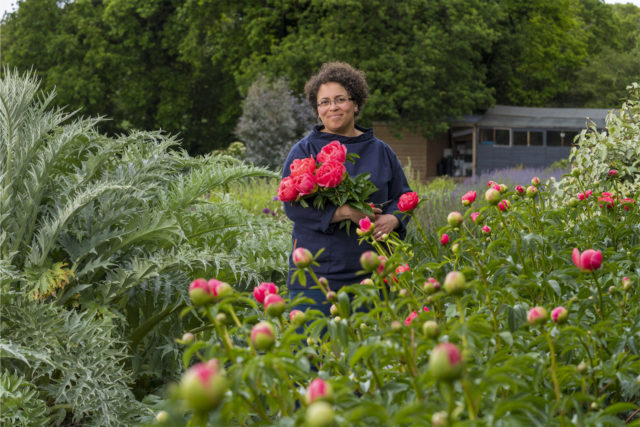 Erin: You’ve been working in the horticulture industry for more than 20 years. Would you share with Floret readers the story of how you came to create Forever Green?
Erin: You’ve been working in the horticulture industry for more than 20 years. Would you share with Floret readers the story of how you came to create Forever Green?
Horticulture was not on the curriculum at my high school, and to be honest I had never considered it as a career path in my early life. At the age of 16, I became involved in environmental activism in my local community in East London, and it was here that I met a group of people who cared deeply about our natural environment. It was through them that I made my first visits to farms outside of the city.
I went on to study the history of art and architecture at university, but really my heart wasn’t in it. I dropped out of uni and went to work on an organic farm in Kent; the ethos of this farm was to produce local food for local people. They grew fruit and vegetables that were supplied to customers in local villages on an old electric-powered milk cart via a “veg box scheme,” which was a pretty new concept in the late 1990s. At that time organic agriculture, food provenance, and environmental issues weren’t part of mainstream culture, but now, more than 20 years later, organic food is on our supermarket shelves and is part of everyday life. Food provenance is something that everyone knows about. That shift in understanding about our food systems is what is happening now with flowers.
After spending a couple of years training at different farms, I decided to go back to school; I enrolled at Capel Manor horticultural college back in London to train as a garden designer, bringing together my love of horticulture and creative design. It was there that I met my husband, Robert; we had both enrolled on the Organic Horticulture course as a subsidiary course to our main areas of study. We went on to run our own garden design and landscaping business in London for a number of years before deciding to relocate our family from the city to rural North Norfolk. We have two children, Leia, 23, and Rowan, 19, and we wanted them to grow up somewhere green and safe.
There isn’t much trade for a garden designer in North Norfolk, and I have always wanted to work for myself rather than be someone else’s employee. I’ve always been driven to work outside, and with my work as a garden designer I wanted to work with flowers rather than go back to growing veg! The British flower movement was gathering pace at around the same time I was considering setting up the flower business, and when I discovered other growers across the U.K., I knew that this wasn’t just a wild idea, but something I could actually do! I found some land to rent in 2013; I developed a business plan, started work on the field, and Forever Green Flower Company began trading in April 2014. I joined Flowers from the Farm at this point too; this is a national network of cut flower growers which offers support and networking opportunities to flower growers in the U.K.
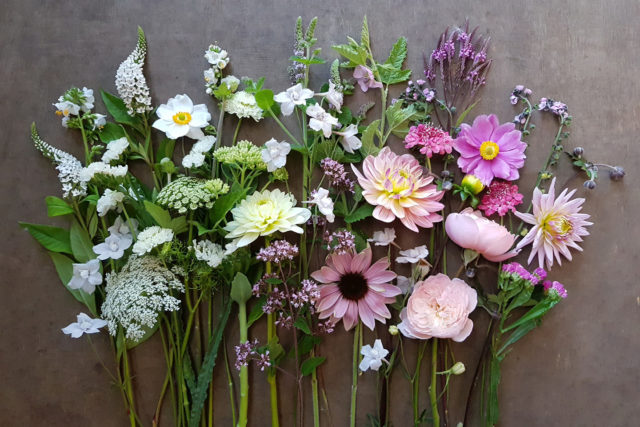 Erin: What led to your decision to focus on flower growing exclusively? Did you have key mentors or others who influenced you?
Erin: What led to your decision to focus on flower growing exclusively? Did you have key mentors or others who influenced you?
When I went back to study at horticultural college, I decided to train in garden design rather than practical horticulture because I loved working with colour, texture, light, and movement — just as I did with art and painting. I use plants and flowers in a garden setting much as you might use paint on a canvas. The flower business isn’t just about growing plants for me; it’s also about producing beautiful material in a sustainable way for floral designers to create with. Over the years I’ve moved right away from growing vegetables to growing flowers because that excites the designer in me.
I’ve been inspired by many fantastic flower growers on my journey — there are a number of growers in the U.K. who are quietly working away, selling amazing flowers and really beginning to build an industry that is going to make a difference. You’re also one of my biggest inspirations, Erin! As well as the gorgeous flowers, you’ve shown us how effective and powerful we can be as a group if we share resources and work together in the spirit of collaboration over competition! This mindset is so at odds with how business usually works, especially the floristry business, but I believe that we will need to work together if we want sustainably grown flowers to be a permanent fixture in the future of flower farming.
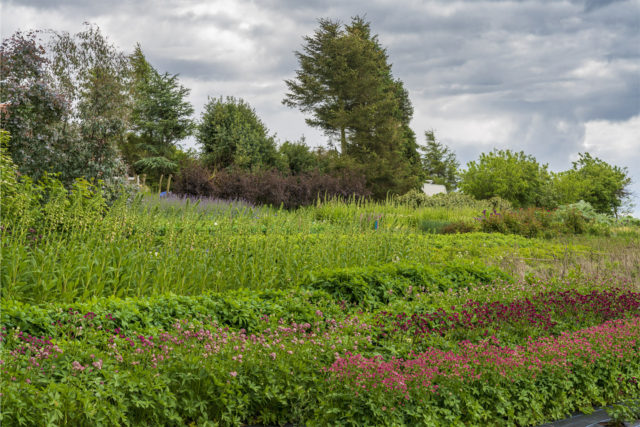 Erin: With your wealth of experience in growing and garden design, you could operate a much larger flower farm. What are the advantages to growing on just 1 acre?
Erin: With your wealth of experience in growing and garden design, you could operate a much larger flower farm. What are the advantages to growing on just 1 acre?
It’s a dream to be able to farm more land! I have been limited by what’s available to rent in my location and the high cost of land here in the U.K. I certainly have plans for what I would like to do in the longer term with a larger acreage that I own myself.
Starting out on 1 acre has been a really beneficial learning experience for me, though — it means that I’ve had just enough land to grow intensively at scale and prove to myself that I can make a living doing this before making a more significant investment. I’m making my mistakes at a manageable scale! I’m particularly interested in the profitability of smaller, hand-scale farms, and I’ve learnt that bigger doesn’t necessarily equate to “more profitable.” Everything I’ve learned since I started the business will be invaluable going forwards when I finally manage to acquire more land.
Erin: How much assistance do you have with your growing operation and deliveries?
I have to give my husband Robert a shout here. I don’t drive at all — I know, it seems like madness in this day and age — but Robert has been here right from the start with his van delivering flowers for me! He started by running flowers to the farmers markets in London for our first four years, and now he makes local deliveries to customers and farm shops here in North Norfolk during the course of his own working week. I wouldn’t have been able to get this business off of the ground without his support!
I also employ a driver on a Wednesday afternoon who runs flowers and foliage between my farm and Julie Clark at Hillcrest Flower Garden. He is a grower who is located closer to Norwich, which is the big city in our region. We work together to supply wholesale flowers to florists in our area.
I have additional help one day a week in the field, but for next season I’m looking at adding more hours for help with cutting as we are so busy.
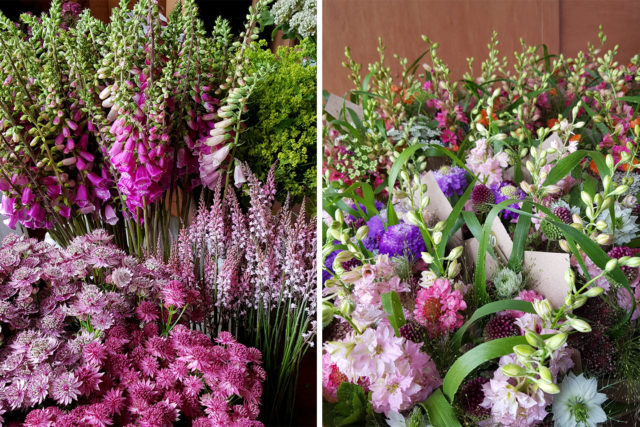 Erin: You offer flowers for direct sale to consumers through both delivery and on-farm pick-up. What does your weekly schedule look like, and how do the farm pick-ups fit in? Do they take place within set hours?
Erin: You offer flowers for direct sale to consumers through both delivery and on-farm pick-up. What does your weekly schedule look like, and how do the farm pick-ups fit in? Do they take place within set hours?
I work long hours through the growing season; I’m usually on site by 6 a.m. and finish for the day between 6 p.m. and 7 p.m.
I am open for general sales Monday to Friday 9 a.m. to 6 p.m., and customers can place bouquet orders for collection direct from the farm through the week. I don’t operate an honesty box or farm stand sales at all. Florists can collect their wholesale orders from 7:30 a.m., and most florist orders are collected from the farm on Wednesdays and Thursdays. I supply four shops with mixed market-style bunches, and these are prepared, delivered and ready for sale in the shops every Friday morning through the growing season. DIY wedding orders are usually collected on Thursdays or Fridays. Flower subscriptions are delivered on Tuesday, Thursday, and Friday — I have to be very organised!
Flower club takes place on one Saturday morning a month, and any growing workshops or farm tours scheduled through the year usually take place on a Monday.
Before the pandemic I would usually spend most of Monday and Tuesday out on the field doing the growing work, with cutting starting on Tuesday evenings through to the end of the week. Most of my sales take place from Wednesday to Friday. This year has seen a shift in my weekly schedule with cutting and selling taking place right from the beginning to the end of the week, and I know that lots of growers in the U.K. have struggled with the necessary growing tasks and having to shift towards running a bigger retail operation in order to get their flowers sold.
With the pandemic our selling schedule has evolved in order for us to maximise sales to mitigate the loss of most of my wholesale flower trade this year. A gift bouquet delivery service was never part of my original business plan. My husband runs his own gardening business, and he travels in a different direction for work each day of the week; we decided to offer a delivery service along his route to work in order to keep the number of journeys we have to make to a minimum and, of course, keep our costs down. Our delivery area is strictly limited, and it has been useful for us to offer this service this year. It has been very hard to keep up with the field work though whilst having to spend so much time making up retail orders through the week, so I’m not sure that I will continue to offer this in the future.
Although I have a very busy week, I’ve organised my time so that for the most part, I can keep my weekends free. I don’t work on Sundays at all, and I make sure I have at least two free Saturdays through the month as well — I’ve learned that it’s so important to make time for yourself in a labour-intensive business like this!
Erin: How would you describe your typical direct-buy customer?
I work in a coastal/rural area which has an older, more affluent demographic. I sell flower subscriptions and bouquets mainly to female customers. I mostly have female attendees of 40-plus years at the flower club. The common link between these local customers and the couples who buy flowers for their weddings is that they love the seasonal nature of our flowers and they are increasingly concerned with the carbon footprint of their purchases. More and more I hear from my customers that they are actively looking for a local, sustainable alternative to imported blooms. Customers are beginning to think about the provenance of their flowers in the same way as they consider their food, and I really want to encourage this conscious consumerism moving forwards.
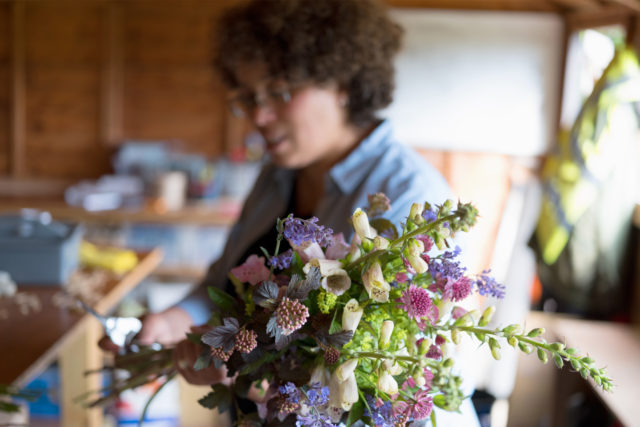 Erin: Tell us about your Seasonal Flower Club. Do you have regulars who come to those gatherings year after year?
Erin: Tell us about your Seasonal Flower Club. Do you have regulars who come to those gatherings year after year?
Our Seasonal Flower Club usually runs on the third Saturday of the month between April and September for up to 12 people. For a couple of hours, you can come to the flower farm and experience the joy of cutting flowers from our field to make your own arrangements at home. It’s a curated cutting experience; I guide our attendees around 10 different varieties from which they can cut stems and then I show them how to strip and prepare each variety for conditioning. I stress the importance of proper conditioning and the effect it has on vase life, and each attendee takes their bucket of flowers home to condition before arranging the blooms later themselves. At each session I demonstrate a different simple, foam-free arrangement technique so that the attendees can see what can be created with the floral material they take home.
I have a few attendees who return as often as they can; I think they take a lot of pleasure from being able to actually cut blooms straight out of the field. When attendees return for sessions throughout the year they get a real sense of seasonality and a completely different palette of flowers to create with each time they come. It’s a challenge to your creativity to cut whatever is at the perfect stage in the field and make a seasonal arrangement, particularly when you are using floral material that you may never have come across before. It’s a unique experience for flower lovers that you can only get from a visit to a flower farm.
Erin: You also offer business workshops for other flower growers, both on your farm and at other farms who host you. What advice do you have for new growers or those interested in pursuing flower farming?
I really identify as a grower and not a florist, so when I saw the need for more educational courses for growers it felt like a perfect fit for my business. I usually run business workshops at beginners and advanced levels on the flower farm, and I have travelled to other flower farms across the U.K. to deliver my advanced grower’s course. Many people love growing flowers, but being able to run a business that is going to earn you a living whilst providing consistently high-quality product for sale is a real shift from growing a few beds of flowers in your garden.
My advice for new growers is to invest some time in proper market research about the industry, your customers, and how you plan to market and sell your product. Developing the selling side of your business is crucial — growing the flowers is easy in comparison! Understanding your production costs will be critical to ensuring the difference between running a profitable business and having an expensive hobby. Don’t let your heart rule your head when browsing the seed and bulb catalogues either; it is so easy to get carried away and end up spending your profits on tons of seed you don’t have room for! Proper planning will save you both time and money.
Erin: Your advanced business course and one-to-one business consultations take place via Zoom. Have you had a lot of interest in these offerings this year, when so much of our interaction is taking place online?
Teaching workshops via Zoom is a very different proposition to having personal interaction in a room with course attendees. I’ve been pleasantly surprised at how much I’ve enjoyed it, and how well the workshops and consultations have been received. One of the great things about online learning is that distance isn’t an issue; I’ve had attendees sign up online who wouldn’t have been able to travel to my location, and I’ve even been consulting with a grower across the other side of the world in New Zealand! With an increase in interest in flower growing over the past year in particular, the workshops often have a waiting list. My beginner level workshop has been suspended due to the pandemic, but I’m looking forward to welcoming new growers back to the flower farm when we are able to at some point in the future!
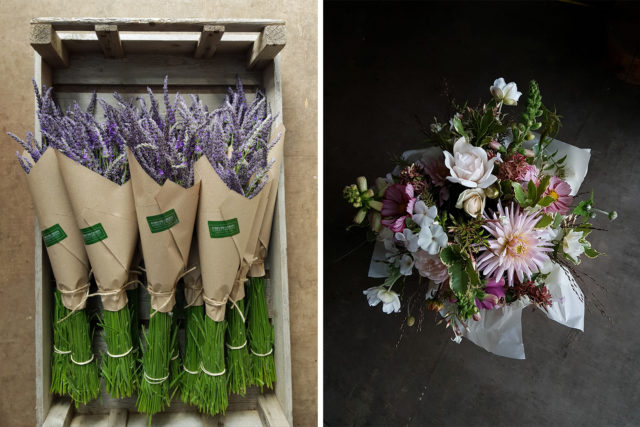 Erin: You also provide flowers for weddings, including bouquets, boutonnieres, and buckets of loose flowers. Have you been tempted to do more extensive wedding work?
Erin: You also provide flowers for weddings, including bouquets, boutonnieres, and buckets of loose flowers. Have you been tempted to do more extensive wedding work?
I love seeing florists use our flowers to create wonderful wedding florals, but I must admit I am in no way inclined to take on that floristry work myself! I am quite comfortable providing the wedding party bouquets as part of our DIY wedding offering, but I always pass on enquiries for full-service weddings to florists who are working in my area. There just aren’t enough hours in the day to do it all, and I’m happiest out in the field with my plants! I want to spend my time growing even better flowers for our florists to create beautiful weddings with! I’ll leave the wedding floristry to the experts!
Erin: What factors have been key to the visibility and success of your business?
This is such a good question — what does any business need to do to succeed? For me, the production of high-quality product with consistency is key, as well as clear communication with my customers and showing the knowledge and passion I have for my field of work; all of these factors have been vital to building this business and moving it forward. Every day is a learning opportunity. As a business owner of colour who wants to be part of a sustainable future I must not be afraid to speak up and talk about the wider issues that concern all of us. Social media is my shop window, and the medium fits so well with the visual nature of flower businesses; learning how to use it effectively to reach my customers and tell my story — without it becoming a chore — has made a world of difference to my visibility in the marketplace.
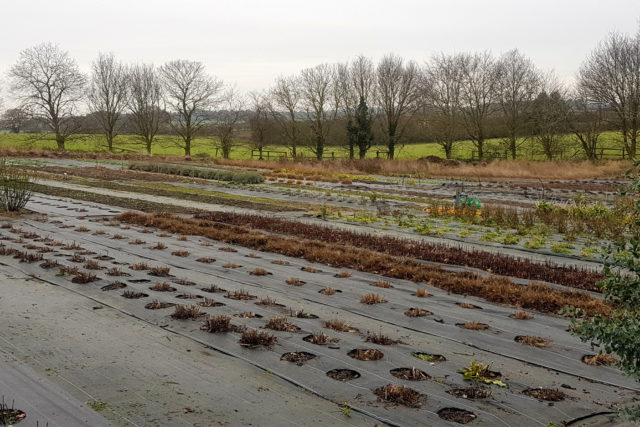 Erin: What do you enjoy most about your business, and what do you find most challenging?
Erin: What do you enjoy most about your business, and what do you find most challenging?
I love the process of growing plants for a purpose: starting with a seed or a perennial division, nurturing the plant, and producing gorgeous flowers that bring so much joy to people. Handing over a bouquet filled with blooms that I have grown knowing they haven’t been flown in or sprayed with chemicals through their production. I know that I am very lucky to be able to just stop in the middle of my day to watch the dragonflies flitting by in the field, or watch a flock of finches settle in some seed heads to feed.
In my 20-plus years in horticulture, one thing in particular is making growing flowers for a living quite a challenging task, and that thing is our changing climate. I talk to small-scale flower growers all over the world, and the changes to our weather as a result of climate change seems to be a worrying challenge for the future that we are all facing, wherever we happen to be located across the globe. I’m committed to working in a sustainable way to mitigate the effects of my own footprint, but it is certainly a challenge to understand the complexities and nuances of all of the purchases and decisions we make. There is a constant process of learning and engagement required which will be an ongoing challenge for me.
Erin: What new projects or ideas are you working on now, and what would you like to pursue next?
I’m always trialling new varieties on the flower farm, and at the moment I’m working on widening the range of perennial varieties I have for sale. You know yourself how long it takes to trial varieties to add to the production schedule, but it’s a process that allows me to indulge my love of plants! In the longer term I would really like to concentrate more on wholesale supply of flowers, but that depends on access to more land which is the next step for me.
I’m also developing new workshop courses at the moment. I’d like to offer a couple of courses that go into a little more depth on specific topics. I’m undecided as yet whether to put the new workshops online, but working in person with the restrictions due to the pandemic does make things more complicated! I hope to offer a mix of online and on-farm workshops if circumstances allow.
One thing that is always at the forefront of my mind is how growers can sell more flowers locally. I work in collaboration with Hillcrest Flower Garden to bring a wider range of flowers to our florist customers, and the idea of developing local wholesale hubs or flower markets is a perennial topic of conversation! I think that it’s so important for growers to build relationships to sell directly to floral designers just like the co-ops we see in the U.S. Groups of growers across the U.K. are starting to try to get local hubs going; there are a number of challenges with this approach to selling, but I really hope that dedicated local, wholesale, sustainable flower markets are something we can develop in the future — watch this space!
Erin: Cel, thank you so much for taking the time to speak with me today and for sharing your experience with us. I’ve really loved having the opportunity to learn more about you and your farm and business. Next time I get to England, I hope that we have the opportunity to connect in person.
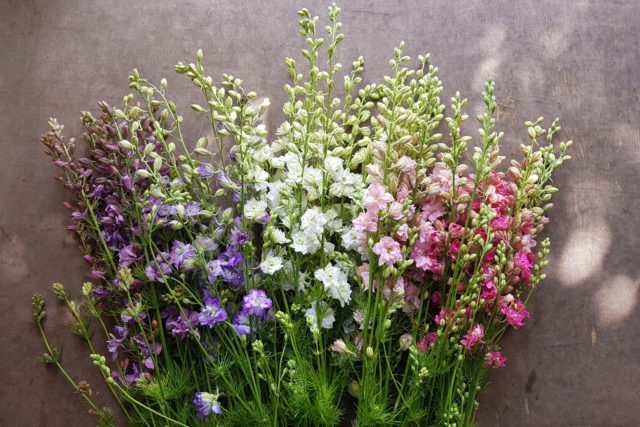 Be sure to follow Cel on Instagram if you aren’t already. In addition to sharing beautiful photos of her farm and flowers, she recently launched a series of educational posts focused on the environmental benefits of locally grown flowers.
Be sure to follow Cel on Instagram if you aren’t already. In addition to sharing beautiful photos of her farm and flowers, she recently launched a series of educational posts focused on the environmental benefits of locally grown flowers.
Connect with Cel:
Website: https://forevergreenflowerco.co.uk
Instagram: @forevergreenflowerco
Facebook: https://www.facebook.com/forevergreenflowercompany/

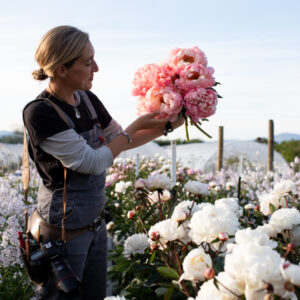
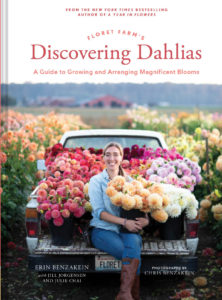
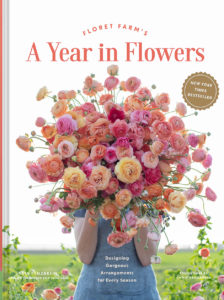
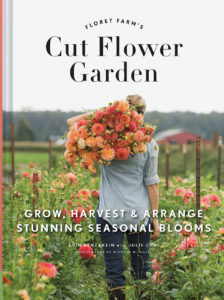

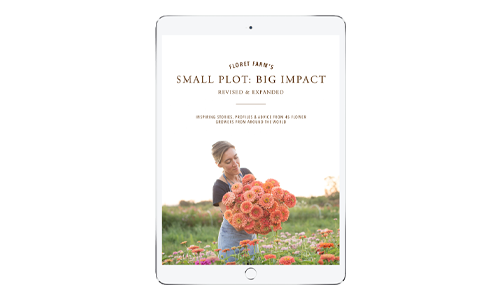
Vallerie on
I loved reading this interview with Cel. She has created a very versatile business out of her love and knowledge of flowers. You both inspire me. I always thought flower growers were large scale operations. Cel does it on an acre. Fantastic!